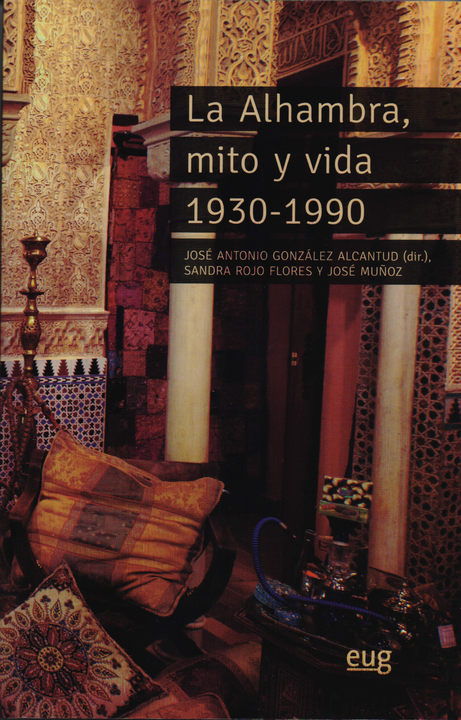Books and publications
Index / Activities / Books and publications / The Alhambra: Myth and Life, 1930-1990
The Alhambra: Myth and Life, 1930-1990
February 08, 20177:00 p.m.
MADRID
Casa Árabe Auditorium (at Calle Alcalá, 62).
7:00 p.m.
Free entry until the event’s capacity is reached.
In Spanish.
Casa
Árabe, the Alhambra and Generalife Board of Trustees and the University
of Granada Press are presenting this work directed by Antonio González
Alcantud and authored with Sandra Rojo Flores and José Muñoz.
The event will include participation by José Antonio González Alcantud, the professor who heads the Social Anthropology Department at the University of Granada; María Isabel Cabrera, the publications director at the University of Granada Press; Carmelo Lisón Tolosana, a scholar with Spain’s Royal Academy of Moral and Political Sciences, and Jesús Bermúdez López, the director of publications for the Alhambra and Generalife Board of Trustees. Presented by Pedro Villena, the General Director of Casa Árabe.
In the last quarter of 2016, the Alhambra and Generalife Board of Trustees, along with the University of Granada Press, published La Alhambra, mito y vida 1930-1990. Tientos de memoria oral y antropología de un Patrimonio de la Humanidad (The Alhambra, Myth and Life, 1930-1990: Touching on the oral memory and anthropology of a World Heritage Site), an innovative research project that collects the oral history of this universal monument: the Alhambra of Granada. The publication is the result of eight years of work by José Antonio González Alcantud, the professor who heads the Social Anthropology Department at the University of Granada and a scholar with the Spanish Royal Academy of Moral and Political Sciences, along with Sandra Rojo Flores and José Muñoz. It reflects in-depth anthropological study of the Alhambra as a place of “living heritage.”
Various episodes narrated by the very people who were involved, those who lived, traded and worked at the Alhambra or who took part in its political and cultural management, are told throughout the text. All took place over a period lasting from 1930 to 1990, an era which coincides with the Second Republic, Dictatorship and Democratic Transition. In addition to delving further into the increasingly deep-rooted concept of “living heritage,” used by anthropologists to counter any purely material way of looking at the idea of the historical monument, José Antonio González Alcantud’s research highlights the paradox existing between the view of Alhambra as a paradise, with a place in the world viewed through Orientalist eyes, in particular within what can be referred to as “domestic Orientalism,” and its more turbulent reality. The study is a true reflection about the Alhambra as a living myth.
In the last quarter of 2016, the Alhambra and Generalife Board of Trustees, along with the University of Granada Press, published La Alhambra, mito y vida 1930-1990. Tientos de memoria oral y antropología de un Patrimonio de la Humanidad (The Alhambra, Myth and Life, 1930-1990: Touching on the oral memory and anthropology of a World Heritage Site), an innovative research project that collects the oral history of this universal monument: the Alhambra of Granada. The publication is the result of eight years of work by José Antonio González Alcantud, the professor who heads the Social Anthropology Department at the University of Granada and a scholar with the Spanish Royal Academy of Moral and Political Sciences, along with Sandra Rojo Flores and José Muñoz. It reflects in-depth anthropological study of the Alhambra as a place of “living heritage.”
Various episodes narrated by the very people who were involved, those who lived, traded and worked at the Alhambra or who took part in its political and cultural management, are told throughout the text. All took place over a period lasting from 1930 to 1990, an era which coincides with the Second Republic, Dictatorship and Democratic Transition. In addition to delving further into the increasingly deep-rooted concept of “living heritage,” used by anthropologists to counter any purely material way of looking at the idea of the historical monument, José Antonio González Alcantud’s research highlights the paradox existing between the view of Alhambra as a paradise, with a place in the world viewed through Orientalist eyes, in particular within what can be referred to as “domestic Orientalism,” and its more turbulent reality. The study is a true reflection about the Alhambra as a living myth.

